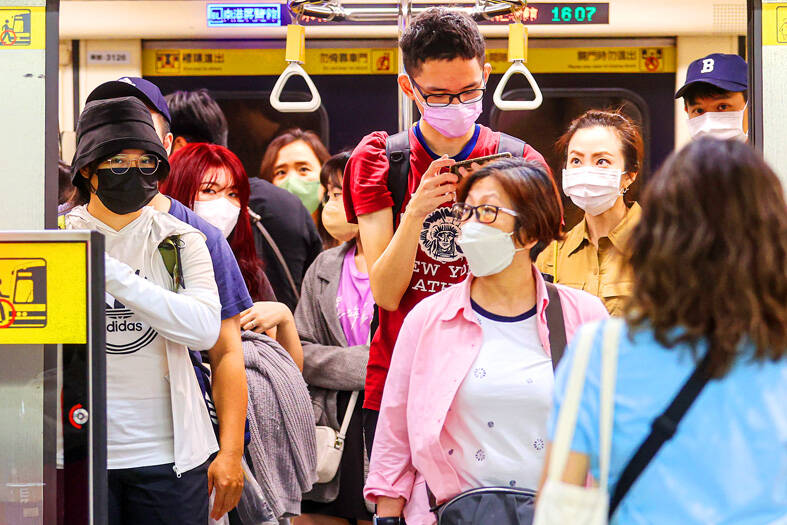From today, Taiwan is further relaxing COVID-19 restrictions by removing its mask mandate for all forms of public transportation, leaving medical facilities as the last category of venue where masks are still required.
Masks are still mandatory at medical and healthcare facilities — including hospitals, clinics, pharmacies, senior welfare institutions, long-term care centers, children and youth service centers, and residential homes for people with disabilities — as well as in ambulances, the Central Epidemic Command Center said.
However, within those facilities, people are allowed to remove their masks for specific purposes, such as eating and drinking, undergoing tests and taking pictures, or if they feel unwell, it said.

Photo: CNA
People are advised, but not mandated, to wear a mask if they are elderly or immunocompromised, have respiratory symptoms or a fever, or visit places that are crowded or poorly ventilated, the center said.
Students are no longer required to wear masks on school buses, but should still put on a mask if they need to visit the school health center, the Ministry of Education said.
Taiwan lifted its mask mandate for school campuses on March 6.
Paratransit buses — which provide services to people with mental or physical disabilities, as well as seniors with limited mobility — are classified as a form of public transport and would therefore not require passengers to wear masks, the center said.
The mask requirement for public transport, which included train stations and airports, was first announced by the Ministry of Transportation and Communications on March 31, 2020 and went into effect the following day.
The requirement was later expanded in May 2021, when Taiwan experienced its first wave of COVID-19 infections, with the government requiring everyone to wear a mask outside their homes.

MAKING WAVES: China’s maritime militia could become a nontraditional threat in war, clogging up shipping lanes to prevent US or Japanese intervention, a report said About 1,900 Chinese ships flying flags of convenience and fishing vessels that participated in China’s military exercises around Taiwan last month and in January have been listed for monitoring, Coast Guard Administration (CGA) Deputy Director-General Hsieh Ching-chin (謝慶欽) said yesterday. Following amendments to the Commercial Port Act (商港法) and the Law of Ships (船舶法) last month, the CGA can designate possible berthing areas or deny ports of call for vessels suspected of loitering around areas where undersea cables can be accessed, Oceans Affairs Council Minister Kuan Bi-ling (管碧玲) said. The list of suspected ships, originally 300, had risen to about 1,900 as

Japan’s strategic alliance with the US would collapse if Tokyo were to turn away from a conflict in Taiwan, Japanese Prime Minister Sanae Takaichi said yesterday, but distanced herself from previous comments that suggested a possible military response in such an event. Takaichi expressed her latest views on a nationally broadcast TV program late on Monday, where an opposition party leader criticized her for igniting tensions with China with the earlier remarks. Ties between Japan and China have sunk to the worst level in years after Takaichi said in November that a hypothetical Chinese attack on Taiwan could bring about a Japanese

The WHO ignored early COVID-19 warnings from Taiwan, US Deputy Secretary of Health and Human Services Jim O’Neill said on Friday, as part of justification for Washington withdrawing from the global health body. US Secretary of State Marco Rubio on Thursday said that the US was pulling out of the UN agency, as it failed to fulfill its responsibilities during the COVID-19 pandemic. The WHO “ignored early COVID warnings from Taiwan in 2019 by pretending Taiwan did not exist, O’Neill wrote on X on Friday, Taiwan time. “It ignored rigorous science and promoted lockdowns.” The US will “continue international coordination on infectious

DEEP-STRIKE CAPABILITY: The scenario simulated a PLA drill that turned into an assault on Taiwan’s critical infrastructure, with the launchers providing fire support Taiwan yesterday conducted this year’s first military exercises at Longsiang Base in Taichung, demonstrating the newly acquired High Mobility Artillery Rocket System’s (HIMARS) ability to provide fire support and deep-strike capabilities. The scenario simulated an attack on Penghu County, with HIMARS trucks immediately rolling into designated launch areas and firing barrages at the Wangan (望安) and Cimei (七美) islands, simulating the provision of fire support against invading forces. The HIMARS are supposed to “fire and leave,” which would significantly increase personnel and equipment survivability, a military official said. The drill simulated an exercise launched by the Chinese People’s Liberation Army (PLA) Eastern